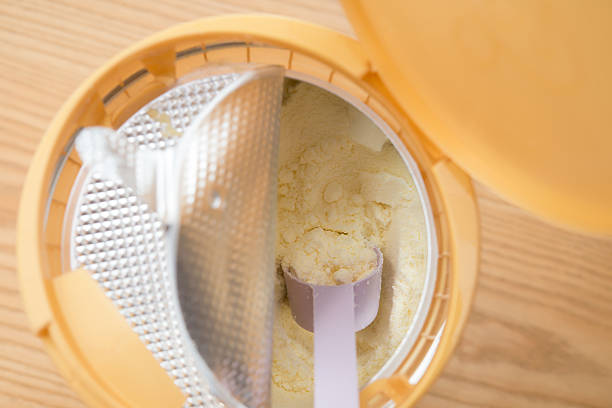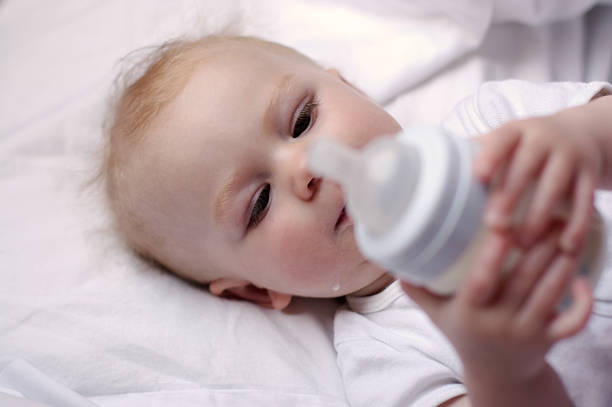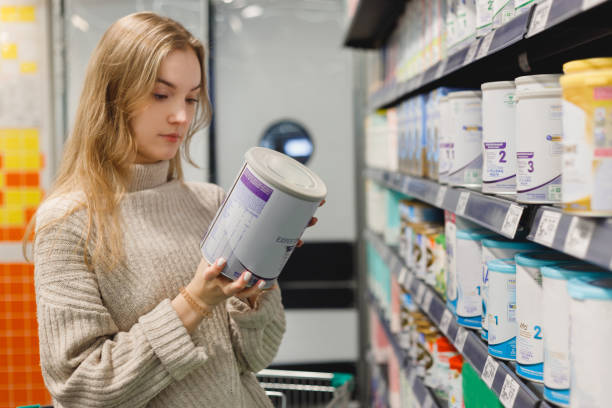Many parents frequently wonder how to properly switch breast milk for baby formula and make sure the infant gets the right amount of nutrients. The numbers tell the whole story! The number of cans required each month will vary depending on your particular circumstances. But if you’re not breastfeeding and want to know how many formula cans you need each month, what would be a reliable estimate?!
If they aren’t breastfed, a baby between the ages of 0 and 2 months will require roughly 14 cans of formula. One can may last three to four days if you feed a baby who is between 0 and 2 months old between 8 and 12 times daily as advised. The majority of cans of infant formula weigh 12.5 pounds (oz).
The demand for formula shifts as children get older, and the monthly amount needed rises as well.
The frequency of your feedings and whether or not the baby is exclusively or partially breastfed will determine this. If the formula is replacing breastmilk, the amount given to the baby should be comparable to breastmilk.
The various factors to take into account when deciding how many formula cans you should keep on hand at home will be covered in this article.
How Many Cans of Formula Per Month
Baby’s Age
How many formula cans you need each month will also depend on your baby’s age. Due to their small stomachs, newborns won’t require much feeding.
The general recommendation is to give a baby more than 2 ounces of formula after 3 hours or when they start to show signs of hunger.
Newborns typically feed 8 to 12 times per day, which translates to 24 ounces of infant formula consumption.
Knowing the number of formula cans per month will be easier with these details. Your baby will require more formula as they get older because their bellies will also grow.
They will also require less formula when your doctor gives the all-clear to feed your little angel solids after six months.
Type of Formula
There are many different kinds of formulas to choose from, which explains why the aisle devoted to them at the grocery store is always packed. Finding the best infant formula is one of the challenges of being a parent.
The amount of protein in baby formula can be used to classify it. Because most babies tolerate cow’s milk protein well, the majority of baby formula brands use it. For infants who struggle with cow’s milk protein, there are other options. Soymilk protein and hydrolyzed protein supplements are substitutes.
Babies who cannot process the lactose in cow’s milk benefit greatly from the soymilk protein formula. There are formula products available with 100% hydrolyzed proteins for infants with even more severe sensitivities.

Number of Feedings
Infants can be fed in a variety of amounts throughout the day, as shown in the summary table above. Given that more feedings would necessitate more formula, the number of feedings should be a key consideration when determining how many cans of formula you should have each month.
Let’s revisit the 5-month-old child as an example. Using average values, the aforementioned calculation was performed. The calculation of 750 oz per month was done under the assumption that the baby would be fed 5 oz 5 times a day, which is the recommended amount for 5-month-olds to consume (4-6 oz, 4-6 times daily).
If the infant were fed four or six times each day, this value would be significantly different. A total of 600 ounces would be consumed each month if the infant received 5 ounces four times per day. Feeding the infant 5 ounces six times a day, on the other hand, would total 900 ounces per month.
If we continue to assume that one can of formula can make 200 oz of milk, then feeding a 5-month-old four times a day would require only three cans of milk, whereas feeding the same baby six times a day would require five cans of formula that month.
Amount Per Feedings
When caring for a baby, both the number of feedings and the amount of formula fed per feeding have a significant impact on how many cans of the formula are required each month.
We’ll use the 5-month-old’s case as an example once more. The total amount of formula required each month will vary significantly depending on whether the baby consumes 4 oz or 6 oz per feeding, assuming that the baby is fed an average of 5 times per day.
If the infant consumes 4 ounces at each feeding (for a total of 5 feedings per day), the total monthly intake will be 600 ounces. Contrarily, a baby who received 6 ounces of formula at each feeding and did so on a regular basis would consume 900 ounces in a month.
In the event that a single can of formula can prepare 200 ounces of milk, feeding the infant 4 ounces of formula per feeding would require 3 cans of formula that month while feeding the infant 6 ounces of formula per feeding would require 5 cans of formula.
How Long Does a Can of Formula Last for a Newborn
Your baby can drink a different volume of liquid formula from each powdered formula container. A typical can that weighs 12.5 Oz can produce 80 to 82 fluid ounces.
However, large cans that are around 22 oz produce 140–143 ounces, depending on the brand, while bulk refills that are between 30 and 36 oz can produce up to 203 fluid ounces.
In other words, if a baby only consumes 32 ounces of formula per day at most, it will take them 3, 5, and 7 days to finish 12.5, 22, and 30-36 Oz cans, respectively.
Typically, 0.3 oz of formula will be in each scoop. The recommended ratio of 1:2 (1 scoop to 2 ounces of water) indicates that it will take approximately 42 scoops to finish a 12.5 oz can.
When the powered formula is combined with water, it should produce more food. A scoop of 0.3 Oz, for example, will result in more ounces of liquid food, so the baby will be satisfied with less. Cans will outlive their expected lifespan in the long run.

Can a Can of Formula Go Bad?
To ensure the freshness of the baby formula, handling guidelines are provided by the manufacturers. These specifications cover things like how they should be stored, when they should expire, and other details.
Under the right circumstances, formula cans that have not been opened can stay on the shelf and remain fresh until they expire. On the other hand, opened cans must be consumed within a month of being opened.
The maximum safe time for prepared formulas is 2 hours, or 24 hours if they are refrigerated. These also apply to infant formulas that are ready to feed.
Close Note
There are a few things to think about when figuring out how many formula cans are required each month. The type of formula, the baby’s age, the frequency of feedings, and the amount given per feeding are just a few of the variables mentioned above.
Given the wide range of formula products on the market, it is strongly advised to calculate the total amount of formula required per month rather than focusing on the number of cans. After you’ve calculated the total, you can determine how many cans of baby formula are required based on how much milk each can of formula can produce.
FAQs
How Much Formula is Healthy for the Kids?
For babies who are between 0 and 2 months old, it is typically advised to use 2-3 ounces of formula per bottle.
The formula dosage should then be increased by 1 ounce in a single feeding every month after that. For growing children, a maximum of 7-8 ounces of formula is healthy.
Are Formula-Led Babies Healthy?
The best option available to moms who choose not to breastfeed or who experience physical discomfort while doing so is the formula.
Baby formula is thought of as a healthy substitute for breast milk. However, you shouldn’t rely solely on the formula.
How to Extract Maximum Benefit Out of the Formula?
The formula should only be diluted with water when you are about to feed the baby to prevent spoilage.
It will last for a few hours or days if you store the can and any leftover prepared formula in the refrigerator.
How Much Formula is Enough for Newborn?
After a 2-hour gap, a newborn can consume 1 to 2 ounces of infant formula. When your baby shows signs of hunger if they are only receiving formula, give them more food. The majority of the time, newborns will eat 8 to 12 times per day.



